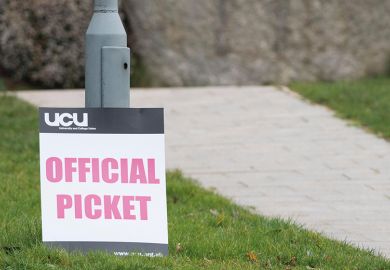Academics at 65 UK universities are on strike over proposed pension cuts but they might as well stay on strike even if the cuts are abandoned.
Although some reform of the sector’s pension fund – the Universities Superannuation Scheme (USS) – seems inevitable, much of it has little to do with the financial sustainability of the scheme.
It has mainly to do with the logic of consumerism that the government has imposed on universities since the introduction of tuition fees.
USS, the largest pension fund in the country with £60 billion of assets, is a defined benefit (DB) scheme, guaranteeing a fixed ratio of members’ salary as a pension. University employers, based on a contested valuation, are proposing to move to a defined contribution (DC) scheme, a much less generous arrangement in which pensions are determined by the fund’s investment returns. Like in every other sector, employers are invoking the economic climate and an increasingly ageing population.
The union proposes that employers should raise their contributions. At first glance, it might not seem obvious why universities should do so. Raising contributions means less money for everything else that universities are meant to be doing: research, teaching, student support.
Those on strike make several arguments. Some argue that they have chosen to pursue a career in a relatively low-paid sector on the expectation that there will be a generous remuneration upon retirement.
Although the expectation is perfectly reasonable, the argument cannot justify why universities should keep this generous scheme open for new academics.
A different argument focuses on the potential impact on universities’ ability to attract and retain talented researchers. Such an impact, however, is hard to quantify. Besides, universities can respond that they are ensuring recruitment of talent in less costly ways – for instance, by offering competitive salaries to the most talented researchers.
We should, of course, lament the UK’s general turn towards privatised, DC pensions. They are anathema to the welfare state. They solve the problem of the increased longevity of the population by passing the risk entirely on to employees, hence avoiding the risk of pension bankruptcy.
Still, a strike aimed at protesting against the general trend might seem both futile and self-serving. The justification for the strike, from an impartial standpoint, cannot just be that academics’ interests will suffer.
Nor is the issue merely technical, about which valuation of the scheme is financially correct. It would be unfair to base cuts on a flawed valuation but experts routinely disagree on economic forecasting.
Meanwhile, however, the strike is gaining the support of both students and the public; its momentum is unprecedented. And that is because the proposed cuts are a symptom of the many things that have gone wrong in UK higher education.
Since the introduction of tuition fees the government has gradually forced upon universities a host of perverse incentives. University income now depends much less on state funding. To some degree, this should not be objectionable. Graduates earn more than others and so it is fair to pass some of the cost of higher education on to those who most benefit from it. The system is supplemented by government loans, payable only if one’s income reaches a certain threshold. Nothing about this mode of funding necessitates a betrayal of the centuries-old values of UK higher education.
Yet the effects have been extremely corrosive. Students increasingly think of themselves as consumers rather than learners. They judge the quality of their degree in terms of value for money. That would not be bad if value meant academic or intellectual value. The state must ensure the quality of public goods, including non-tangible ones which, unlike, say, health outcomes, are harder to measure. But the criteria for judging quality must relate to the nature of the good in question.
And the problem is that students are now led to judge the value of their degree against criteria such as student satisfaction and facilities, future earnings, even the amount of effort required to pass a course. Some of these criteria are peripheral to the aims of higher education, while others directly contradict it.
The primary aim of universities is to produce and impart knowledge at an advanced level. Knowledge is an intrinsic good: it may benefit those who have it, or the economy as a whole, but that is not why it needs producing and imparting. The value of understanding the origins of the universe, or what it means for the law to be just, does not depend on whether the country’s GDP will increase, or whether graduates will earn more. Some of the world’s most important scientific discoveries and advancements in arts and humanities were made by the Ancient Greeks, who did not think of knowledge as instrumental.
Nor is the process of acquiring knowledge meant to be enjoyable; it is by nature demanding and time-consuming. Of course, having conquered knowledge usually gives one satisfaction. But we should not confuse this with the claim that the point of learning is satisfaction: learners feel satisfaction because they have done something valuable, not the other way around. The excellence of university teaching consists in its content, not the experiential effects it has on the students.
As the process of learning is by nature hard, student experience is a poor proxy for teaching quality. In 2005, the National Student Survey (NSS) was established, asking students to report on their learning experience. Anyone who has taught in higher education knows how unreliable such surveys are.
A superficial coverage of a topic can easily make an otherwise enthusiastic lecturer hugely popular. And some of the brightest people ever to teach at university were disliked by students for teaching in demanding ways. Students can be made to feel happy without learning anything.
Fancy sports halls, state-of-the-art auditoriums and 24-hour replies to queries can positively transform the student experience. But universities are not private members’ clubs with a £9,250 annual fee.
Why has this consumerist culture become so pervasive? Neither students nor universities are to blame.
The government made the NSS a formal component of its assessment criteria under the newly established teaching excellence framework (TEF), which feeds directly into league tables. This creates incentives for a race to the top: if a university is to be competitive in attracting students, it must do well in the NSS. It has to outperform its competitors in offering services that are costly yet peripheral to the good of education.
The result is massive investments in student facilities and in highly paid administrators whose job is to improve student experience.
But British universities do not have endowments. To finance these investments, they take out big loans in capital markets. As these loans have to be paid back through tuition fee income, universities need to grow their student numbers.
This is a bubble similar to the subprime mortgage crisis in the US: the banking sector had no reason to invest in the subprime mortgages, which ultimately led to its collapse. But before the collapse, it was rational for each individual bank to enter this market because all of its competitors were doing the same.
The same collective action problem applies to universities: the sector has no reason to prioritise funding for sports halls and student bars over funding for research and teaching. But when the financial viability of a university depends on student satisfaction, each university is rational in investing financial resources in order to outperform its competitors. And the investment of the sector is likely to prove toxic: league table performance is volatile and the student market may dry up, especially after Brexit.
Meanwhile, UK universities are estimated to have borrowed £3 billion in capital markets since 2016, which is a huge amount compared to the total annual income of £30 billion of the whole higher education sector.
Nor are students to blame. They are not blind to universities’ race to the top of improving student experience.
Being treated like a consumer makes you behave like one. And the problem is that, in good faith, they soon start making demands that undermine their own education: shorter reading lists, easier exam papers, more contact hours at the expense of academics’ research time. University administrators in turn put pressure on academics to satisfy student demands in order to boost the department’s NSS score, often in ways that interfere with academic freedom. Everyone is behaving rationally, yet the academic values of higher education are being eroded little by little.
So here is why the strike is so important: it exposes the toxic bubble that the government has created. Naturally, universities are unable to raise substantially their pension contributions when they are investing heavily in student satisfaction.
A sector-wide pension scheme, in which risk is shared by all universities, is a financial liability that diminishes borrowing power and ability to grow. It is not that academics are entitled to a generous pension scheme. It is that they are entitled not to be deprived of a viable pension scheme for the sake of consumerist ends that offend the aim of higher education and undermine student learning.
George Letsas is professor of the philosophy of law at UCL.
Register to continue
Why register?
- Registration is free and only takes a moment
- Once registered, you can read 3 articles a month
- Sign up for our newsletter
Subscribe
Or subscribe for unlimited access to:
- Unlimited access to news, views, insights & reviews
- Digital editions
- Digital access to THE’s university and college rankings analysis
Already registered or a current subscriber?








